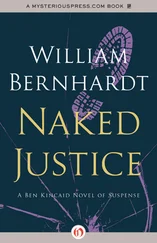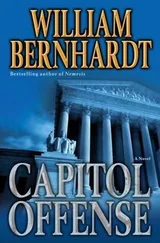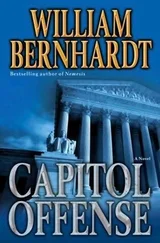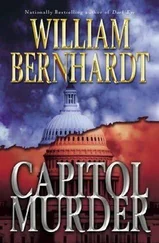“I only hope you’re right,” Margaret said. “I don’t like being in the public spotlight.”
“It won’t be for long. How many spouses of Supreme Court judges can you identify?”
“Umm, none.”
“Exactly.” He took his wife’s hand and squeezed it. “Once the confirmation process is over, no one will be interested in you anymore.”
“Well, I think you could’ve phrased that a bit more gallantly.” She grinned. “But I understand what you’re saying.”
He scooted closer to her. “I know you’re uncomfortable with all this. I apologize for dragging you through it.”
“Don’t be daft. What were you going to say? ‘No, Mr. President, I don’t want to be on the Supreme Court. It might upset my wife’s tummy.’ ”
“You’ve put up with quite a lot from me, over the years. Don’t think I don’t know that. I don’t deserve—”
She placed a finger over his lips. “Shhh.” She leaned forward and kissed him on the cheek. “You’re my hero. My knight in shining armor. You saved my life.”
He shrugged. “That fire was no big deal.”
“I was talking about the day you married me.”
They settled back into their chairs, hands clasped tightly together.
Ben sat at his assigned desk in the Senate, staring at the mass of people surrounding him, wondering how he had ever gotten into this mess, wishing he were at home watching this on C-SPAN. Or not.
The Senate floor was packed. Every desk was filled. All one hundred senators were in attendance, and each seemed to have at least three clerks or assorted other flunkies at their bidding. The gallery was packed with spectators and interested parties. Ben, like everyone else, had noticed that Judge Haskins and his wife were sitting in the first row, front and center. Richard Trevor, the head of the Christian Congregation, was sitting directly behind him, a sure sign that his organization intended to throw its support to Haskins as soon as the opportunity presented itself. Even the lame-duck Vice President was present, making one of his rare appearances in his constitutional role of President of the Senate, just in case he should be needed to cast a tie-breaking vote. Unlikely—all the polls indicated that Roush’s nomination would fail by at least ten votes. The Republicans clearly had the forty-one votes necessary to sustain a filibuster. Ben had to count on Keyes’s promise that the threat would not be exercised, or Roush’s nomination would never come to a vote at all.
Christina was huddled in the back of the room, sitting with Bertram Sexton and Kevin Beauregard and Gina Carraway and her clipboard. Right up to the last minute, she had been analyzing data and trying to root out any potential weakness in the opposition, possible undecideds. She hadn’t found any.
Jones and Loving were also in attendance. If Ben was going to pull this off, it would be because of them.
Thaddeus Roush stepped through the back doors of the gallery. A sudden silence blanketed the room, followed almost immediately by an intense volley of whispers. Roush ignored it. It was ironic, really: this debate was all about him, but he had to sit up in the gallery.
Roush walked to the front row, looked both ways—then took a seat beside Judge Haskins, directly in front of Richard Trevor.
Ben shook his head. He didn’t care what Roush had done in his confused youth. He had guts. This country needed him on the Supreme Court.
Ben watched as Christina folded a note and passed it to a Senate page. More polling data, no doubt. Probably some new survey Gina had transmitted via Instant Messenger.
He took the note from the page and unfolded it.
I LOVE YOU, it said. GO GET ’EM, TIGER.
He had to smile.
The Vice President gaveled the Senate into session. Game on.
58
Ben was hardly surprised when the Vice President and President Pro Tem recognized Senator Keyes, chairman of the Judiciary Committee, to orchestrate the debate, and Keyes promptly recognized a series of die-hard Republicans to speak first.
“…and what are we to tell our children, good Christian American children who have been taught to exercise restraint, to practice abstinence, that abortion is a crime against God and nature? Are we to tell them that the murder of an innocent fetus qualifies them for appointment to the highest court in the land? Is that the message we want to send to the children of America? Or perhaps, do we want to send a different message? A message that says that there is still such a thing as morality in government. That strength and character still matter to the people of the United States. That the Supreme Court is no place for those who would desecrate and offend the fundamental values of this great land.”
Ben saw the senator subtly adjust his speaking position. At first, he thought the man must be positioning himself for the C-SPAN camera, but then he realized that what he was really doing was turning his back to Judge Roush, seated above and behind him in the gallery. Apparently the coward wanted to confront him without confronting him. He needn’t have bothered. Roush maintained a perfect stone face, neither smiling nor scowling, just letting it all roll off him.
“…but if not now, when do we draw the line?” the senator continued. “Do we want to live in a world where homosexuals control the law of the land? This man has been engaged in an ongoing relationship with another man, a relationship that is still illegal in many states and will always be an abnegation of God’s word. Now we learn that before he embarked on one sinful relationship, he had yet another, that he actually paid for a murder. A legalized murder, to be sure, but no less horrendous for it, no less shocking to the conscience, no less offensive to our collective consciousness.” His voice boomed. “What will happen to us as a nation if we allow this abomination to be enshrined in the Supreme Court?”
Ben pondered. A plague of locusts? Death of the first-born? Armageddon?
“Judicial activism! That’s what will happen!”
Ah. Well, that was my next guess.
“We cannot open the door to judges who seek not to interpret the law, but to make the law. Lawmaking is the sovereign right of this body, this Congress, and no judge has the right to force his own decadent beliefs on the laws we create. Look where these people have put us today. No prayer in school. Immigration run rampant. A Swedish minister arrested for condemning homosexuality. The world is in chaos! This is no time to allow—”
“Pardon me,” Senator Keyes said, gently interrupting. “I believe that your five minutes on the floor are over.”
That was the first time today Keyes had enforced his own time limit. Was it possible he was just as tired of this tirade as Ben was? One could only hope.
“Mister Chairman,” said Senator Bening from Colorado. “Could I be permitted to say a few words about a man from the great state of Colorado who does tremendous justice to the bench on which he sits, Judge Rupert Haskins?”
“Point of order,” Ben interrupted, before Keyes had a chance to respond. “Aren’t we supposed to be debating the nomination currently before the Senate?” His voice dropped a notch. “Rather than speculating about the possibility of any future ones?”
Keyes made a clucking sound. “Well, I’m sure Senator Bening intends his remarks to relate to the matter at hand. The Chair recognizes Senator Bening of Colorado.”
Ben didn’t need to listen to the oration to know where it was headed. He’d seen the crowd of Haskins supporters, many of them bused in from Colorado, outside the Capitol building carrying signs with slogans like: HERO OR HOMO?
“…and I concur with Senator Scolieri about the need for judges who know the meaning of the phrase ‘judicial restraint.’ Judge Haskins has been on the bench for almost twenty years and his record is utterly unblemished. He decides the cases before him without overreaching to reshape society in his own image. He knows what it means to be a judge of men and a defender of the law.”
Читать дальше








